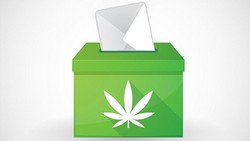This election, as the country casts their votes for President, New Jerseyans are also flipping over their ballots to decide the fate of marijuana legalization in their state—and the numbers are trending toward the referendum being passed.
After a lengthy and unsuccessful campaign to legalize recreational pot at the level of the state legislature, the decision is being left up to voters in New Jersey as Public Question 1, the “Marijuana Legalization Amendment.” The ballot asks New Jerseyans to answer “yes” or “no” to this question: “Do you approve amending the Constitution to legalize a controlled form of marijuana called ‘cannabis?’”
An April 2020 Monmouth University poll found that 61 percent of New Jersey adults would, at the time of the poll, vote for legalization, with 34 percent saying they would vote against it. Additionally, 62 percent think a legal cannabis industry would help the economy, whereas only 10 percent think it would hurt the economy.
A more recent October 2020 Fairleigh Dickinson University poll shows these numbers have remained essentially the same: 61 percent will vote for legal weed while 29 percent will not.
Patrick Murray, Director of the Monmouth University Polling Institute, said that sentiments toward marijuana have changed in New Jersey over the past few years.
“When I first started polling in New Jersey six years ago, very few thought that recreational marijuana legalization was viable here,” said Murray. “Only a third of the people thought New Jersey should go through with it.”
“Now,” he said, “As we see more and more states going through with this, people in illegal states are starting to change their minds. Fifty percent of people are advocates for legalization, while another 10 percent don’t mind if it passes and are voting ‘yes.’”
Joseph Patten, Ph.D., Associate Professor of Political Science, explained that New Jersey’s public worker pension fund, the least-funded in the country, could benefit from legalization.
“New Jersey isn’t allowed to run deficits, so to get around that the state runs them through the pension system,” Patten said. “We’re having trouble paying our bills. One solution that’s been put forward is using taxes from the sale of legal pot to add to the fund.”
“It’s kind of like looking under the couch cushions for change,” Patten continued. “The government essentially regulates morality with a sin tax on things like alcohol, cigarettes, and gambling. What proponents of legalization are proposing is the same thing, but with marijuana.”
Patten also explained arguments from the other side. “A lot of people think that the government has a responsibility to protect the morals of kids, too,” he said. “And that means not exposing them to things that are potentially harmful.”
During his campaign in 2017, Gov. Phil Murphy (D) made recreational marijuana a large part of his platform, calling for its legalization within his first 100 days in office. However, opponents in the state legislature repeatedly rejected the proposal, where it stagnated until the ballot initiative was introduced.
Socially, legal weed has been a point of contention when it comes to criminal justice. “Historically there’s evidence of selective enforcement of marijuana laws,” Patten said. “Blacks and whites use pot at about the same rate, but blacks get arrested for it much more frequently.”
Similarly, in an Oct. 20 article for The Star-Ledger, Robert H. Scott III, Professor of Economics, said, “Roughly one-third of those in prison in New Jersey are incarcerated for non-violent drug-related crimes…Ignoring the deeply concerning sociological implications of marijuana crime enforcement, the state spends considerable amounts of money policing, trying and imprisoning people who are recreational marijuana users.”
“What we’re seeing going into the 2020 elections is a pretty consistent six to ten majority,” Murray said. “Since all the referendum needs to pass is a simple 50/50 majority, if we go with what the polls are saying it’s probably going to pass.”
IMAGE TAKEN from Norml.org



